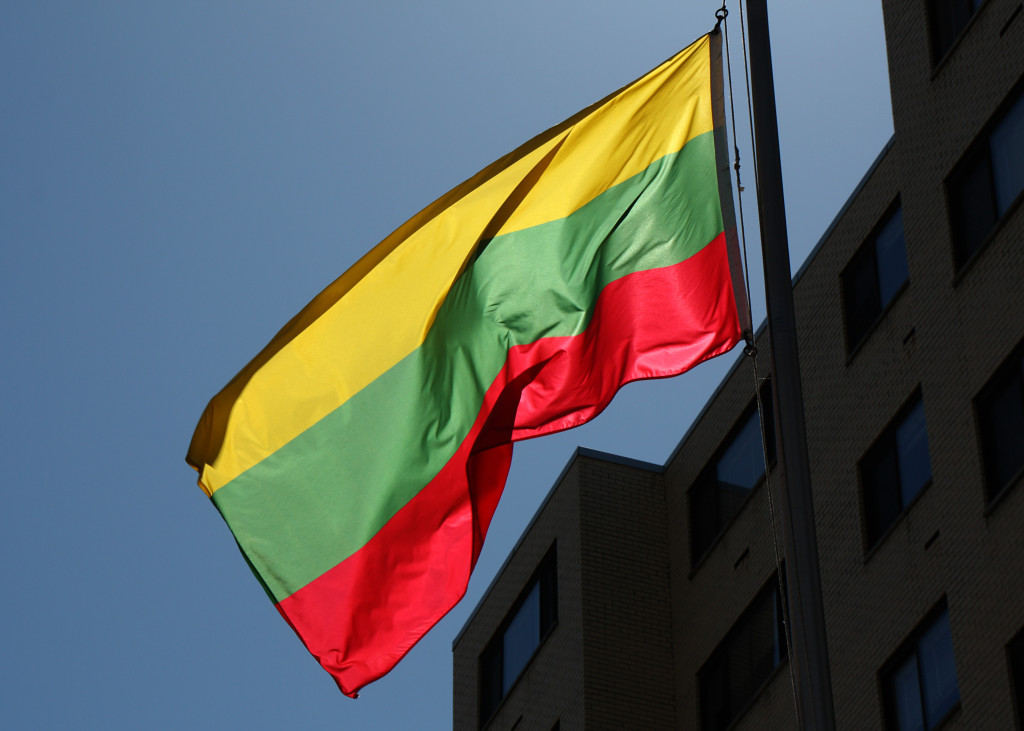In light of the serious political crisis in Belarus, Lithuania is positioning itself as a strong advocate of EU-wide sanctions against members of the Lukashenko regime, responsible for election fraud and police violence. The Western EU member states, on the other hand, are usually cautious not to provoke Russian intervention.
Vladimir Putin assured Alexander Lukashenko that, if necessary, he would set up a reserve police force for deployment in Belarus. What role does Lithuania play in the EU’s Eastern policy? How should the EU deal with Russia and the suppression of democracy in Belarus? An interview with Petras Auštrevičius, Lithuanian MEP of the “Renew Europe” Group and the European Parliament’s Standing Rapporteur on Belarus.
A Centuries-Long Relationship
Lithuania and Belarus maintain economic and cultural relations that go back centuries. The two countries once formed the Grand Duchy of Lithuania. After the fall of the Iron Curtain, Lithuania embarked on the course of Western integration and became a member of the EU and NATO in 2004.
The country, with a population of about 2.8 million, is one of the ten largest investors in Belarus. This is largely due to the lack of competition on the market and low labour costs for Lithuanian entrepreneurs. Belarus is also an important transit country for Lithuanian and Polish goods. In addition, a large part of Belarusian exports pass through the Lithuanian port Klaipėda.
Lithuania has been supporting Belarusian civil society for a long time. The Lithuanian capital Vilnius is located only 170 kilometres from Minsk and serves as the centre of the Belarusian opposition in exile. Vilnius is also home to the “European Humanities University”, which was shut down by Lukashenko in 2004. Several Belarusian non-governmental organisations have likewise relocated here.
One issue that has dominated relations between the two countries in recent months is the planned launch of the nuclear power plant in Astravets, 50 kilometres from Vilnius. Lithuania is the most active critic of the nuclear power plant, which is a personal prestige project for Alexander Lukashenko. The country has repeatedly criticised violations of safety and environmental standards in this project.
Lithuania’s Reaction to the Crisis in Belarus
Lithuania immediately issued a clear response to the violence with which the Belarusian authorities repressed the peaceful protests that followed the controversial re-election of Lukashenko. Without hesitation, the Lithuanians joined the Belarusian opposition. The Lithuanian Government does not recognise the regime of the ruler Lukashenko as an elected government and is calling for new elections.
The country has also given refuge to Svetlana Tikhanovskaya, the presidential candidate of the Belarusian opposition. In response to the suppression of the protests, the Lithuanian government has facilitated the entry of refugees from Belarus.
The expressions of solidarity on the streets of Vilnius and a human chain leading to the Belarusian border demonstrate once again the strong commitment of Lithuanians to democracy and the rule of law in the neighbouring country.
On Monday, August 31, Lithuania, Latvia and Estonia imposed travel bans on the Belarusian ruler Alexander Lukashenko and 29 other officials, expressing the impatience of the Baltic countries with the EU’s cautious approach. Belarusian Foreign Minister Vladimir Makei said on Wednesday, September 2, that Belarus would impose retaliatory measures against people from Lithuania, Latvia, and Estonia.
Lithuanian MEP and the European Parliament’s Standing Rapporteur on Belarus, Petras Auštrevičius (Renew Europe) was recently prevented from visiting Belarus, while his Polish colleague and the Chair of the European Parliament’s delegation for relations with Belarus, Robert Biedron (S&D), was deported from Minsk.
Should the EU Follow the Lithuanian Lead?
The Lithuanian message is clear: the EU must act faster. “We said that we need peaceful dialogue and agreement between the regime and society, but we see that the regime is not ready for that,” Lithuanian President Gitanas Nauseda said. “We see that we need to move forward and to show an example to other countries.”
In times, when concerns about the increasingly aggressive rhetoric in East-West relations are growing, Lithuania puts great importance both on constructive exchange and on defending the fundamental values of democracy.
Lithuania sees one of the solutions in personalised sanctions, which, while directed against Alexander Lukashenko and those involved in electoral fraud and ill-treatment, are not directed against the Belarusian people. The risk of deadlock is growing; the ball is in the EU’s court.
Interview with Petras Auštrevičius, MEP (Renew Europe)
Mr Auštrevičius , how would you assess Lithuania’s role in EU’s eastern policy?
Lithuania is a strong supporter of the EU’s transformative power, which we experienced by our own example. Our economic, political and social achievements, while preparing for and during the EU membership, are tremendous and provide an undeniable proof of the positive EU influence. We believe in replicating our success in the Eastern Partnership countries and do not see the EU supported reforms nor as an interference into their internal matters, nor as usurping their potential. On the contrary, we relate with the people of the partner countries and wish them to fulfil their European dreams, particularly the quality of life.
Some EU member countries, Lithuania included, are pushing for a more vigorous response from Brussels to the crisis in Belarus while other member countries, like Germany, are more cautious. How can the EU find a common voice in order to uphold its fundamental values and to avoid the risk of a stalemate?
The 26 years-long of Lukashenka’s regime had an immense damage over Belarus. Due to its seclusion, Belarus was barely active in a political map of Europe. Passiveness and obliviousness of the EU towards Belarus became a usual behaviour, which does not help when an urgent reaction to events in Belarus is needed. It creates a wrongful image, as if the EU turned away from Belarus and its people, became indifferent to their tragedy.
The Lithuanian approach towards Belarus, also, underwent different phases, but we never lost our focus. We are connected by a shared history and a joint border, which represent strong people to people connections, economic cooperation and security threats. We posses a thorough expertise on Belarus and it would be mutually useful if the EU, including Germany, would hear our advice and support our initiatives turning them into the European ones.
With its delayed and reserved reaction on Belarus, the EU is losing its credibility as an ultimate defender of the fundamental freedoms and human rights. Our Belarusian partners are closely following our statements and it is crucial to abstain from declarations, for example, questioning the belonging of Belarus to Europe, particularly by the high-level officials. We have to support and provide further impetus for Belarusians’ fight for their future.
Russia is a key player when it comes to the geopolitical aspect of the crisis in Belarus. What would be your recommendations for a viable Western (EU and NATO) approach to Russia?
Russia is the one turning the situation in Belarus into a geopolitical matter. It sees Belarus as its own territory, where it can act as it wishes, and has no intention of reducing such dominant influence. The Putin’s Russia with its expansionist policies is not interested in the democratic changes in Belarus. Therefore, the EU has to defend the democratic values and their strengthening in Belarus.
Crimes and violations of democratic principles by Russia cannot be tolerated. The words used by the West to condemn such crimes must gain a form of action. It is urgent that the EU finalizes the Magnitsky type human rights sanctions mechanism and applies it against the Russian officials, who are taking an active part in the election fraud, politically motivated persecutions and violation of the fundamental freedoms, including the freedom of speech.
 Petras Auštrevičius, MEP (Renew Europe) – an economist, former Lithuanian Ambassador to Finland and was chief negotiator for Lithuania’s accession to the EU. He was Chancellor of the Government of the Republic of Lithuania from 1999-2000 and Chairman of the Liberal Movement of the Republic of Lithuania from 2006-2008. From 2004-2014 he served as a Member of the Lithuanian Parliament and from 2013-2014 as its Vice-President. Since 2014, Auštrevičius has been a Member of the European Parliament, where he is a member of the Committee on Foreign Affairs as well as the European Parliament’s permanent rapporteur on Belarus
Petras Auštrevičius, MEP (Renew Europe) – an economist, former Lithuanian Ambassador to Finland and was chief negotiator for Lithuania’s accession to the EU. He was Chancellor of the Government of the Republic of Lithuania from 1999-2000 and Chairman of the Liberal Movement of the Republic of Lithuania from 2006-2008. From 2004-2014 he served as a Member of the Lithuanian Parliament and from 2013-2014 as its Vice-President. Since 2014, Auštrevičius has been a Member of the European Parliament, where he is a member of the Committee on Foreign Affairs as well as the European Parliament’s permanent rapporteur on Belarus
The article was originally published at: https://fnf-europe.org/2020/09/04/lithuania-takes-a-clear-stand-on-the-belarus-crisis/?fbclid=IwAR2DQCAiJvEdrw3D11ahGZ3MOTkybsaz9u8W9N2-NYrPNUseGYsRL8rPQPQ
Continue exploring:
Human Freedom Waning in Many Countries
Bulgaria’s March Against Corruption



